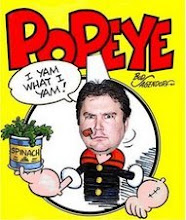I am sure by now, after reading my column on a regular basis like you do, you realize my head is positively enormous. Even a cursory glance of the picture accompanying my article makes clear my head is both melonesque and becoming round. After years of soul searching contemplation, I have discovered why! Much like Violet Beaureguard of Willy Wonka fame that turned into a blueberry as a symbolic punishment for her gum chewing uber-habit, I began to turn into Pac Man as a child. Alas, I played the game for hours after breaking the eighth commandment by stealing money from my sleeping dad’s wallet. Indeed my rotund torso is approaching a spherical shape. Leading the charge is my Pac Man shaped mug. As Pac Man has made a profound difference to my physique, it also has made its way into my head as being profoundly spiritual. With this in mind, this excursion into literary greatness will delve into a hopefully fruitful two week examination of how Pac Man relates to a relationship with Christ.
First I need to get you up to speed if you aren’t familiar with the game. The hero, Pac Man, is a yellow, pie-missing-a-slice-shaped chap who weaves his way through a maze eating small dots. There are 4 strategically located bigger dots called “power pellets” that render him invincible for a selected amount of time with certain limitations. The bad guys in the game are four ghosts named Blinky, Pinky, Inky and Clyde. They mortally wound our hero when they touch him, unless he has recently eaten a power pellet. When he eats one of these jewels, the normally colorful ghosts all turn a midnight blue color and run for their lives to avoid being eaten by Pac Man. Upon “chomping” them, they turn into a pair of eyes and float back to the center of the screen where they rematerialize as the bad guy again, after a short period of time. To finish a screen in the game our hero must eat all the dots before getting eaten. The screens get faster and faster until you finally bite the dust. Once a screen a bonus fruit item appears for bonus points but disappears if not eaten promptly. Certain point levels render the player bonus lives. You play until you have exhausted all your lives or completed all 256 levels including a glitched level in which there is part of the screen messed up by bad game coding. Such a game is ripe (in my mind) with shadows of the reality of Christian living.
First the enemy. Our enemy is obviously the devil. The four ghosts in the game represent the devil’s methods of trying to defeat us. Blinky symbolizes taking our eyes off Jesus. The devil likes nothing more than to create doubt to someone seeking Christ. Much like in Matthew 14 when Peter walked on water to meet Jesus (who was already waltzing across the lake), when we keep our eyes on Him, our faith is strengthened, when we take our eyes off Him we sink. The devil twists the message of the cross into us becoming a Christian to “have a great life” or to “fill a God shaped hole” and away from the fact that the reason He died on the cross was to save us from the sin penalty we deserved (Romans 6:23). We tell others to become a Christian so they can have this great life, then something bad happens and they lose faith and fall away. Tough times are a reality in this fallen world we live in. A health and wealth “gospel” saying Jesus will fix all our problems is no gospel at all. He will be there with us through all things and give us the necessary grace to make it through, but He has no interest in making heaven on Earth for us. We grow in faith by keeping our eyes on Him through rough seas. Through this refining, we are made more like Him.
The second ghost is Pinky. The human pinky is the thinnest and weakest finger on the hand. The devil, similarly, often tells us that we are too thin and weak to serve God. Think of all the bible characters who seemed too weak to do anything, yet, with God’s mighty power, became superheroes of faith. Several come to mind. Moses in the first four chapters of Exodus makes it clear he is too weak. 20 pages later in my bible he leads thousands of his closest friends on an escape trip away from an evil ruler, and God gets the praise. Gideon in Judges 6 goes from scaredy cat to warrior and God gets the praise. There are others!
The third ghost is Inky. Inky is the other extreme. The Pharisees “inked” law after law to exhibit their righteousness. They followed their written law to the letter, but also maximized every loophole when convenient. Jesus spent more of His time on earth fighting the devil-given self-righteousness of these men than He did addressing the “real sinners”. The devil loves the law when we use it to glorify our self-righteousness. He trembles in fear when we use God’s perfect law as a mirror to expose the sin in our life. Take a quick glance through the ten commandments in Exodus 20? I don’t know about you, but I don’t measure up.
The last ghost is Clyde. Clyde symbolizes the good ole boy in us. Good ole Clyde seems like a fine man. He saves the whales, pays his taxes, and feeds his kids. Everyone likes him and trusts him. He has no obvious glaring sin in his life and does lots of nice things. He seems heaven bound if anyone does (so the devil tells us). The problem the devil wants to hide from us is that good ole boys need Jesus like the rest of us sinners. Romans 3:23 says “For all have sinned and fallen short of the glory of God”. Romans 6:23 says “For the wages of sin is death, but the free gift of God is eternal life in Christ Jesus our Lord.” All of us need the same amount of help. Some seem good, some seem bad, but all need to fix the sin issue to avoid its wages.
Next week we will look at the rest of the symbolism of Pac Man and summarize. If you have questions about Christianity, email me at markapplegate@alltel.net. It is my goal to be there for you as you consider Christ’s claims. God Bless fellow Pac Men (and Women!).
Subscribe to:
Post Comments (Atom)


















No comments:
Post a Comment